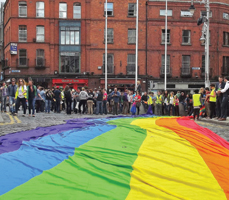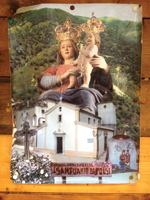For centuries, priests and bishops have been intimidated by Italy’s ruthless gangs. Now the Vatican and the state are combining forces to fight the menance of organised crime
Up in the hills of Calabria in southern Italy, at the end of a long winding track, there is a sanctuary in honour of Our Lady of the Mountain. It is called Polsi, a cluster of grey stone buildings so insignificant that it does not even figure on a car satellite navigation system. But every September, around 200 members of Italy’s most powerful, and probably most cruel, Mafia organisation join the pilgrims here to give their devotion to the Virgin Mary.
The ’Ndrangheta has long been even bigger in organised crime than Sicily’s Cosa Nostra. It is la Piovra (“the Octopus”) with its tentacles all over the Italian – and international – economy. It is involved in almost all the cocaine trafficking into Europe and is worth an estimated 3.4 per cent of Italian GNP – twice as much as the car maker Fiat. And the ’Ndrangheta’s ties to the Catholic Church are old and close. Polsi is a good example.
“In 1966, the parish priest was murdered. Not because he resisted the Mafia but because he supported the wrong family,” says Calabrian journalist Arcangelo Badolati, author of 15 books about the ’Ndrangheta. “The police found a revolver in the dead priest’s pocket. In 1989, the priest who was then treasurer of the Polsi sanctuary was murdered. Again, not because he refused to deal with the Mafia. He was found to have two billion lire – then about £750,000 – on his bank account.”
Until very recently, intimacy between the Church and the Mafia was just part of life in southern Italy, as Badolati explains: “The most important religious festivals in the towns were all managed by ’Ndrangheta members. Priests received Mafia cash to celebrate baptisms with ’Ndrangheta godfathers. The religious processions were stopping in front of the houses of ’Ndrangheta leaders.”
And then there was money laundering said to involve the IOR – the Istituto per le Opere Religione, more commonly known as the Vatican bank. Pope Benedict began steps to clean up the bank, a process continued by Pope Francis. The latest stage, under negotiation, is a proposed agreement between the IOR and the Italian state that would lead to the closure of the remaining secret bank accounts held by Italian nationals in the Holy See. There are reportedly 359 individuals who, illegally, have €183 million (£133m) in such accounts. Under the agreement, they will have until September to report this money to the Italian tax authorities after which time they will become liable to legal proceedings. The Vatican has closed around 3,000 such accounts since 2013.
Badolati describes Pope Francis as a public enemy of the Mafia. Just over a year ago, the Mafia murdered a three-year-old boy in a town in Calabria, prompting the Pope to excommunicate not just the boy’s killers but all Italy’s Mafia gang members.
“It is a re-awakening of souls,” says Salvatore Nunnari, Archbishop of Cosenza-Bisignano. “For a simple priest in a little town, when a Mafia member comes and says, ‘You must do this for me’, it is not easy to say no. Now, he can say, ‘I can’t disobey the Pope!’”
But well before Pope Francis’ declaration of excommunication, other priests were resisting the Mafia. In 1995, a priest from northern Italy, Don Luigi Ciotti, set up an organisation called Libera that called on the authorities to put confiscated Mafia property to good use. The following year, the Italian Parliament agreed a law to allow this.
IN LAMEZIA TERME, where seminarians are this weekend to receive instruction on resisting the Mafia, parish priest Don Giacomo Panizza recalls that more than 200 properties were confiscated from Mafia families but there were no takers when they were put up for sale. Don Giacomo agreed to take over the villa of the most powerful Mafia family, the Torcasios, to house his association for disabled people. The Torcasios left but kept their keys.
Over the following months, while builders were renovating the huge, four-storey building – installing access ramps and lifts for the wheelchair users – intruders came at night and broke windows and ripped out the electricity, Don Giacomo says. No one in Lamezia dared come and change the locks on the doors.
And Don Giacomo was, he admits, afraid for his life. He started to have a recurring nightmare: “There’s a young man running. Two armed killers are chasing him. He runs but eventually collapses exhausted and the killers shoot him. I arrive and take the dead man in my arms. And the young man looking up at me has my face.”
Don Giacomo may have been worried for his life, but the Torcasios were disorientated too. “Instead of men with guns they had, as their enemies, disabled people they despised. This is the wonderful thing about this story,” says Don Giacomo, his blue eyes gleaming. “It was them with machine guns and us with wheelchairs. They opened the way … they led others to dare to make good use of this confiscated property and stand up to the Mafia. They started a revolution. It’s beautiful.”
Stocky and energetic with a bulky black parka zipped up to his clerical collar, Don Pino De Masi is the Calabria representative of Libera and the parish priest in Polistena. In 2000, he led a group of schoolchildren to the square in front of the Mafia building where they staged what he calls an occupation. One of the Mafia godfathers, from his office on the fifth floor, offered to buy all the children ice cream. Don Pino made sure they turned down the offer but promised the children that one day they would be on that fifth-floor balcony looking down on the square. In 2009, the building was confiscated. Don Pino has turned it into a youth club.
We drive out of town to see an agricultural cooperative he has set up called Valle del Marro on 130 hectares of confiscated ’Ndrangheta land. It is useful proof for young people that you can make an honest living in Calabria, Don Pino says. They grow lemons, tangerines and aubergines and make olive oil, tapenade and Calabrian chilli pepper paste.
One of the workers, Antonio Napoli, tells me this: “We young people had a great desire to free this land of the Mafia mentality. The Mafia try to stop this project. They come here and destroy the olive trees and agricultural equipment. But we are not afraid. Our determination is reinforced by the courage and optimism of our Catholic faith.”
John Laurenson is a freelance journalist.





 Loading ...
Loading ...
What do you think?
You can post as a subscriber user...
User Comments (0)